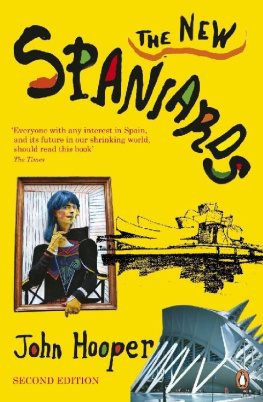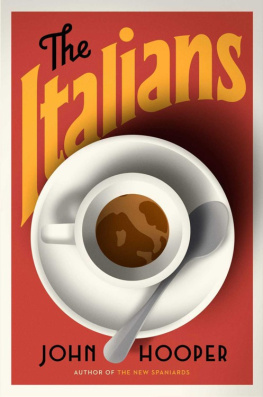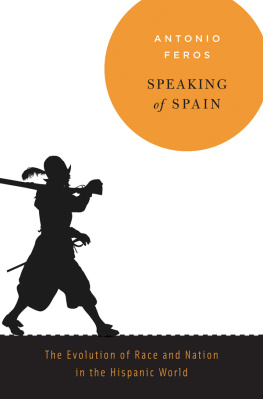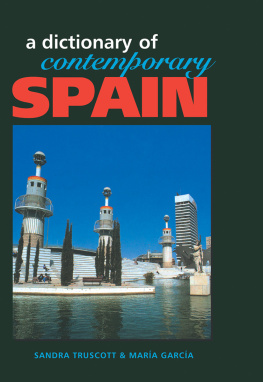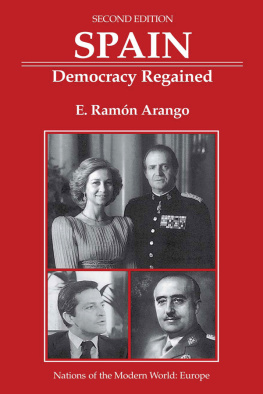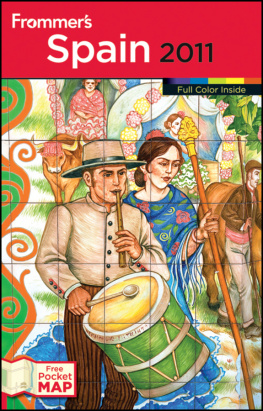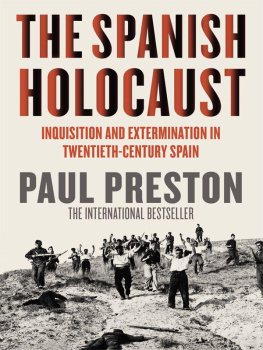PENGUIN BOOKS
THE NEW SPANIARDS
John Hooper was educated at St Benedicts Abbey in London and St Catharines College, Cambridge. At the age of eighteen, he travelled to Nigeria during its civil war to make a television documentary. Since then, he has spent more than twenty years as a foreign correspondent, working for among others The Economist, the Guardian, the Observer, BBC, NBC and Reuters. For several years in London, he was a presenter of BBC World Services Twenty Four Hours current affairs programme. Hooper has reported from more than thirty countries, including various war zones most recently Kosovo and Afghanistan. He developed a special affection for Spain and its people after being posted to Madrid to cover the countrys eventful transition to democracy, and later returned there. This book draws on his experiences of nine years living in Spain. Hooper is currently Rome correspondent of The Economist and the Guardian. He is married to a fellow-journalist, Lucinda Evans.
The forerunner of this book, The Spaniards, won the Allen Lane award for 1987.
JOHN HOOPER
T HE N EW S PANIARDS
Second Edition

PENGUIN BOOKS
PENGUIN BOOKS
Published by the Penguin Group
Penguin Books Ltd, 80 Strand, London WC2R 0RL , England
Penguin Group (USA) Inc., 375 Hudson Street, New York, New York 10014, USA
Penguin Group (Canada), 90 Eglinton Avenue East, Suite 700, Toronto, Ontario, Canada M4P 2Y3 (a division of Pearson Penguin Canada Inc.)
Penguin Ireland, 25 St Stephens Green, Dublin 2, Ireland (a division of Penguin Books Ltd)
Penguin Group (Australia), 250 Camberwell Road, Camberwell, Victoria 3124, Australia (a division of Pearson Australia Group Pty Ltd)
Penguin Books India Pvt Ltd, 11 Community Centre, Panchsheel Park, New Delhi 110 017, India
Penguin Group (NZ), 67 Apollo Drive, Mairangi Bay, Auckland 1310,
New Zealand (a division of Pearson New Zealand Ltd)
Penguin Books (South Africa) (Pty) Ltd, 24 Sturdee Avenue,
Rosebank, Johannesburg 2196, South Africa
Penguin Books Ltd, Registered Offices: 80 Strand, London WC2R ORL , England
www.penguin.com
The Spaniards first published by Viking 1986
Revised edition published in Penguin Books 1987
New and completely revised edition published under the present title 1995
Second Edition 2006
Copyright John Hooper, 1986, 1987, 1995, 2006 All rights reserved
The moral right of the author has been asserted
978-0-14-192774-9
F OR L UCY
Contents
The Falangist ascendancy los aos de hambre cities
under siege the arrival of the technocrats los aos de
desarrollo Spain becomes more European internal migration
in the 1960s the legacies of Spains economic miracle |
A challenge fit for a king apertura or ruptura? the fall
of Arias Surez: a man in a hurry the political reform bill
and referendum the birth of the UCD the 1977 election |
Fiebre autonmica Tarradellas and the restoration of the
Generalitat the 1978 constitution an experiment out of
controlthe fall of Surez a comic-opera coup el estado
de las autonomas the Socialists ride to victory |
Gonzlezs first 100 days the nationalization of RUMASA
industrial reconversion Spain joins Europe
patronage and discipline the NATO referendum burying a dream |
Celebrating prosperity sex and money and High
Society GAL the 1988 general strike an opposition
in search of a leader Juan Guerra the FILESA
affair 1992: Spains year of years the Catalan
breakthrough a tide of scandal the 1996 election |
Banking on the euro the economy surges the PP wins
outright Zapatero: an unexpected choice hardening
attitudes, growing discord Aznar steps aside la nouvelle
society nightmare in Madrid an electoral earthquake |
How Franco left his marka generous tolerance gunshots
on the way to school the moles resurface forgiving, or
just forgetting? coming to terms with the past |
Faith and nationhood religious (in)tolerance Freemasonry
Catholics, in name at leastProtestants, Jews and
Moslems Church and state el impuesto religioso the
Church and Franco: from blue to red Tarancn and the
transition the Peoples Party at prayer?Opus Dei |
Service areas with a difference prostitution galore
promiscuity and noviazgo: less than a revolutiona double
oppression the destape contraception abortion gays
and lesbians: from social danger to equal rights |
Women at the top machismo whores and Madonnas
womens status under Franco the gender revolution sexism
and language sexual equality and sexual freedom wanted:
help at home the Spanish stop having children |
Family values, families valued clinging to the nest
violencia machista: domestic violence in the public
eye marriage under the dictatorship the great divorce
law debate alimony and divorcio a la espaola |
Anything but descafeinado the 1997 gaming reforms
bingo mania the Fat One and the Child in the
kingdom of the blindnarcotics your body is your own
of blacks and blondes the botelln and the Ley
Antibotelln |
There for them Juancarlistas, not monrquicos the
Bourbons a monarchy without a monarch the battle
for the succession a modest monarchy the press: censure
and self-censorship the Infantas wed Prince Felipe
Operacin Silenzio an heiress to the throne? |
A cold February morning the age of pronunciamientos
a perilous misunderstanding Guti, Sena and the
de-politicization of the army new rolesthe storming of
Parsley Island a leaner, fitter officer class goodbye to the
mili prosperity and pacifism |
An abhorrent entity a tradition of weak government
Ahora Hacienda somos todos black money and the
Torquemada of tax Aznar changes tack the cuerpos
the reform of the clocks IT and e-government; techno-fear |
Bulls, donkeys and licence plates the impact of geography
the Moslem shock reconquista and reunification
Madrid: an artificial capital the alienation of the Catalans
and Basques Nationalism and nationalism |
An impossible tongue blood and bones an isolated
history traditional Basque society the Carlist wars and the
abolition of the fueros industrialization and immigration
Basque nationalism the civil war and the punitive
decrees ETA is born the ikastolas and the revival of the
language ETAs slow decline an end to terror? |
An industrious people a paradoxical past the Catalan
language Catalonias Golden Age the Renaixena
Catalanism from Mancomunidad to Generalitat
Francos revenge invasion from the south crisis and
recovery for the language |
An unhappy history Santiago de Compostela magic
and witchcraft a tradition of gender equalityemigration
|
Next page
